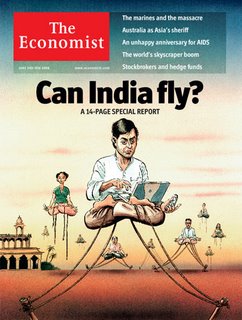Can India Fly?
 The above caption sounds very much like a campaign by somebody who doesn’t like Air Deccan, but it happens to be the theme of a special survey published in the latest issue of The Economist. Since The Economist is a paid site, you either need to get hold of the print edition or have a valid login to access most of the articles.
The above caption sounds very much like a campaign by somebody who doesn’t like Air Deccan, but it happens to be the theme of a special survey published in the latest issue of The Economist. Since The Economist is a paid site, you either need to get hold of the print edition or have a valid login to access most of the articles.All the same, signs of a boom are everywhere. Some 5m new mobile-phone connections are added each month. To meet the soaring demand, Nokia, the Finnish handset giant, last year built a huge factory near Chennai in just five months. Almost every city is seeing frenetic construction. Some 450 shopping malls are being built.
Flights are full, and prices of hotel rooms ruinous. Judging by the lodging allowances set by America's State Department, a room in India's information-technology capital Bangalore now costs $299 a night, as much as anywhere in the world. Industry's costs, too, are soaring: Lakshmi Narayanan, boss of Cognizant, an IT-services firm, says the price of land next to one of his facilities in Chennai, needed for expansion, has risen by 180% in 12 months.
Simon Long, South Asia Bureau Chief of The Economist outlines some of the challenges in this article and the related audio interview.







7 Comments:
I keep repeating that the masses of India are in her villages and towns. The rise of India must be uniform not just in the cities. It is easy to get distracted by the symbolism of thriving businesses and higher disposable incomes of a prosperous few. Nevertheless growth and change is always welcome. The bottle of champagne can wait to be uncorked.
I see increasing references to India in the western media.
As an aside there are many articles at the economist website which can be read without a subscription.
By Anonymous, at 11:44 PM
Anonymous, at 11:44 PM
a hotel room in bangalore may cost the same as anywhere else in the developed world, but the state of infrastructure is poorer even by standards of lesser developed nation
By I, at 12:30 AM
I, at 12:30 AM
Interesting read
By Vj, at 7:54 AM
Vj, at 7:54 AM
Well, seeing from outside(r) India, the future does seem brighter but not so from within. More than anything else, the internal divisions (stoked by partisan politicians) are likely to be the biggest hurdle. I think (and hope/wish), we can still overcome these, because finally, money matters to everyone.
By SLN, at 3:04 AM
SLN, at 3:04 AM
@Rakesh,
I was surprised after hearing that there is acute shortage of manpower. I think the reason is probably due to the mismatch of skillsets. People need to equip themselves with some specific skills mentioned by the corporates.
@Anand Srini,
valid points there. On the points about rural urban divide, another issue to note is the regional imbalance. Some states and regions are doing much better than the other.
Yeah, I know that some of the Economist articles are free. the remaining are mentioned as premium content / pay per view.
@Vikas,
i think it is a case of demand far outstripping supply.
@SLN,
Internal divisions do exist, but the situation is better than before. These issues do need to be ironed out at the earliest.
By Kaps, at 11:35 AM
Kaps, at 11:35 AM
More on this special report here: http://etlamatey.blogspot.com/2006/06/can-india-fly-economists-special.html#links
By etlamatey, at 4:17 AM
etlamatey, at 4:17 AM
Its easy to get carried away when everyone keeps repeating "India is going to boom", "India is forging ahead". It sort of becomes a mantra after sometime, just like politicians talk (no offense to politicians anywhere in the world). The real problems in India are Population and infrastructure facilities to support that population. I went to India last summer and the water in the exact same area that I drank water from 5 years ago, tasted so bad that I had to drink bottled water all the time. I was being taken around on a mercedez but there were no proper roads or highways. when are people going to realize the scientific truth that if population keeps exploding it is going to put pressure on creating infrastructure to help support that population
By Unknown, at 5:50 AM
Unknown, at 5:50 AM
Post a Comment
<< Home